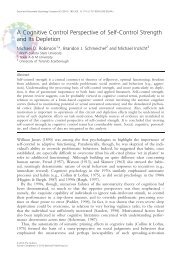Emotions and self-control 1 Incidental and Integral ... - Michael Inzlicht
Emotions and self-control 1 Incidental and Integral ... - Michael Inzlicht
Emotions and self-control 1 Incidental and Integral ... - Michael Inzlicht
You also want an ePaper? Increase the reach of your titles
YUMPU automatically turns print PDFs into web optimized ePapers that Google loves.
<strong>Emotions</strong> <strong>and</strong> <strong>self</strong>-<strong>control</strong> 12<br />
The early research on emotions <strong>and</strong> delay of gratification involved children as research<br />
subjects. Do emotions have the same impact on delay behavior in adults? Fewer studies have<br />
examined delay of gratification in adults. This is due in part to the fact that delay behavior is<br />
more difficult to study in laboratory experiments with adult subjects. Sadly for <strong>self</strong>-<strong>control</strong><br />
researchers, most adult humans easily forego one marshmallow now for two marshmallows later.<br />
Nevertheless, meaningful measures of delay have been devised for adults, <strong>and</strong> the results suggest<br />
that emotions influence delay behavior somewhat differently in adults versus children.<br />
Wertheim <strong>and</strong> Schwarz (1983) reported one of the first studies assessing the link between<br />
emotions <strong>and</strong> delay of gratification in adults. They found that individuals with higher scores on<br />
the Beck Depression Inventory (BDI) chose immediate rewards (e.g., a six-pack of soda now)<br />
over delayed rewards (e.g., two six-packs in 3 weeks) more often than did individuals scoring<br />
lower on the BDI. Although the correlational nature of the study precluded the authors from<br />
making strong causal inferences, their findings fit with the evidence from children indicating that<br />
negative emotions decrease (or lack of negative emotions increases) delay of gratification.<br />
Gray (1999) conducted an experiment to examine the effects of threat-related negative<br />
emotions on “temporally-extended choice,” which is closely related to delay of gratification (see<br />
also Knapp & Clark, 1991). Participants earned small monetary rewards for viewing pictures; the<br />
more pictures they viewed, the more money they earned. Participants <strong>control</strong>led via button press<br />
how quickly the pictures advanced on the display screen, but the picture-viewing task was<br />
arranged so that pressing the button quickly to advance pictures carried a long-term cost. More<br />
specifically, advancing pictures quickly increased the rate of picture-viewing in the short-term<br />
but slowed the rate over the long term, thereby reducing the total amount of money to be earned.



